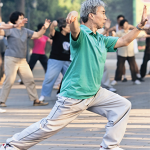Make an exercise plan or contract including when, how often, and for how long you will exercise. Other tips to help you stay motivated are:
- Set realistic short- and long-term goals, and reward yourself when you have achieved them.
- Exercise with a friend or family member.
- Keep an exercise log or chart your progress on a calendar.
- Identify problems or obstacles that are likely to get in the way of your exercise program, and plan ahead how you will deal with them.
- Choose activities that are convenient, relatively inexpensive, and fun!
Discuss your exercise program and any concerns you have with your rheumatologist and/or other arthritis health professionals on a regular basis. With their support and guidance, you will be able to build regular physical activity and exercise into your daily routine and reap the benefits of an active and healthy lifestyle.
ad goes here:advert-1
ADVERTISEMENT
SCROLL TO CONTINUE
Points to Remember
- Having several exercise options and locations keeps you from becoming bored and provides alternatives on those days when getting out of the house seems impossible.
- Recent ACR guidelines suggest that exercise should be one of the mainstays of treatment for osteoarthritis of the hip and knee.


